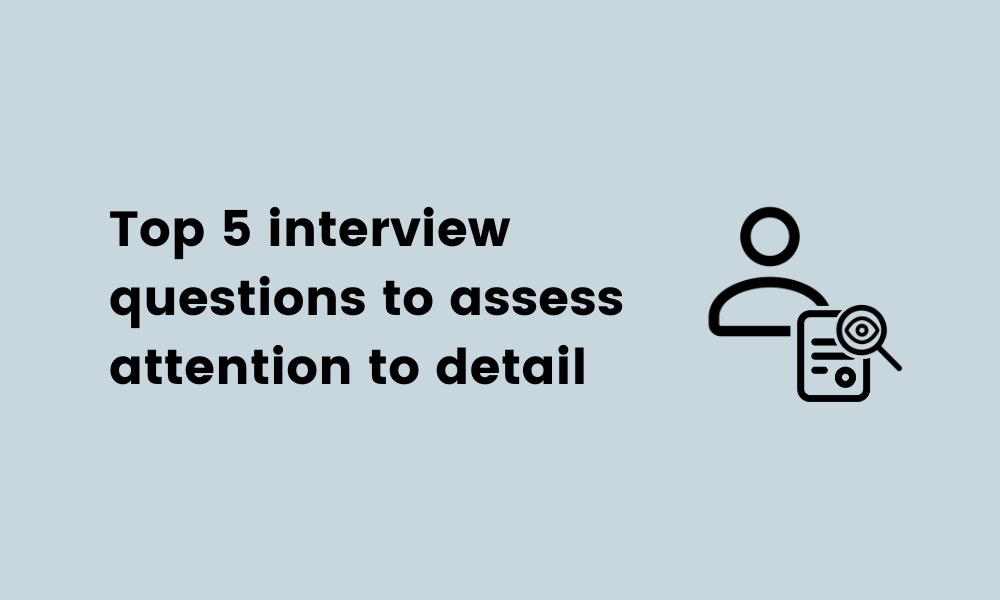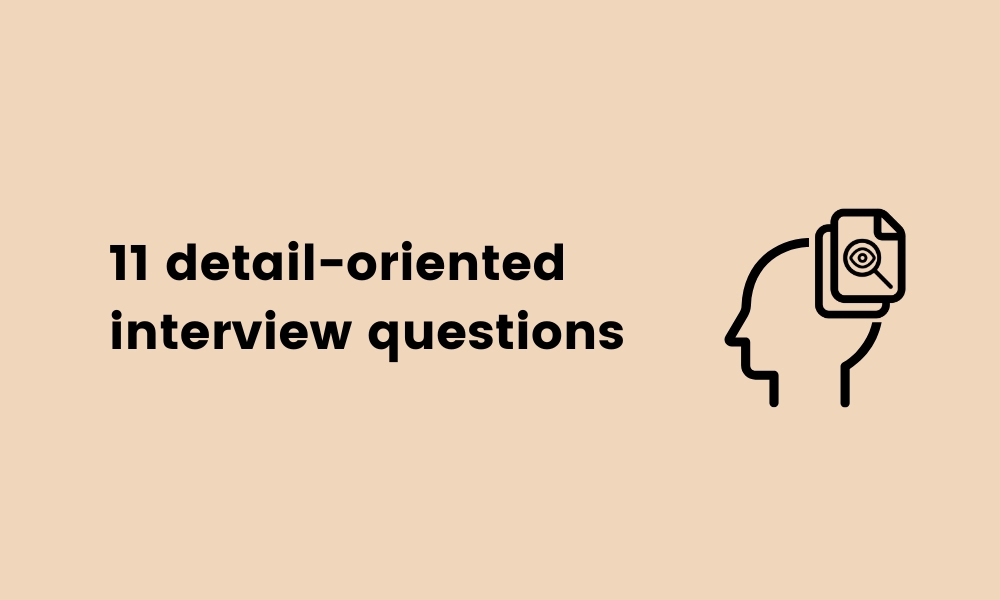Attention to detail is one of the most important traits a new employee can have, yet it’s so often underestimated by employers. Keeping one eye on the small details and another on the big picture is an invaluable skill to possess.
Have you ever received an email in which your name is spelled wrong by the sender? For many people, this detracts massively from the professionalism and warmth of a message. Names, while often difficult to spell, are the most important thing to get right in an email. As such, lacking an attention to detail can lead to costly mistakes and grave ramifications.
But finding detail-oriented employees can be a struggle, as many employers forget the need to assess attention to detail in the pre-screening or interview stages. Fortunately, we’ve outlined a number of key interview questions, which will help you find the best, most detail-oriented candidates out there.
Before you even begin interviewing applicants, however, the best way to filter through applications and see who truly is attentive to detail is to ask candidates to take an Attention to Detail test. And if you want to get the full picture, you can combine it with up to four other tests from our test library for an in-depth assessment of your applicants’ skills.
This way, you can quickly screen candidates and only invite to an interview those who have what it takes to succeed at your open role.
What about the interview phase, then? In this article, we’ll explain how you can assess prospective employees’ attention to detail during interviews.
Table of contents
Top 5 interview questions to assess attention to detail
We’ve given some more detailed answers further down this page, but we thought we’d share with you our top picks of the bunch, the crème de la crème of the attention-to-detail job interview questions.
Here are the best five interview questions enabling you to filter out the highest quality detail-oriented candidates:
Describe your processes for ensuring that your work is error-free.
What tools or software do you use to ensure quality in your work?
You are handed a piece of work done by a colleague and you spot a number of errors. How do you address this?
How do you ensure high quality in the face of tight deadlines?
Have you ever worked on a project that required extreme attention to detail?
How to assess attention to detail before an interview
In the modern world of tight deadlines and lengthy tasks, hiring managers don’t have time to invite each and every job applicant for an interview.
Instead, if potential candidates impress with an error-free resume or cover letter, or they respond immediately to the position, employers can assess their attention to detail through pre-interview tests.
At TestGorilla, we pride ourselves in our huge array of accurate and objective pre-employment tests. Our tests are proven to evaluate potential candidates effectively and extensively, leaving you free to interview only the best quality applicants.
We provide two separate attention to detail screening tests: one for textual detail, and one for visual detail. Both assessments evaluate applicants’ abilities to:
Be attentive and meticulous
Pay attention to important details
Find errors or discrepancies in text or images
Double-check their answers
Candidates’ capacity of analytical and detailed thinking will show in the test results, which you can check to see how everyone performed.
Our candidate assessment software requires little supervision from you. Applicants take the test themselves – which in itself shows strong organizational skills – while you simply need to check the results at the end.
You can then invite the top performers for an interview, safe in the knowledge that these candidates have already proven themselves as detail-oriented people.
If you’re looking for employees who listen carefully, pay attention to small details, produce error-free work, and ensure quality in everything they do, then TestGorilla can assist you in this goal. Give our Attention to Detail test a try to find and hire such employees effortlessly.
For the best results, we advise you to follow up the skills assessment with an interview, in which you can gain a full understanding of your applicants’ skills and qualities.
11 detail-oriented interview questions
To help you streamline your hiring process, we’ve gathered some essential interview questions that you can use to assess attention to detail. You can use them for a variety of job roles. These will sort the detail-oriented candidates from those who lack this skill.
With these interview questions and sample answers, you can be sure to find potential employees who’re able to produce exceptional work and catch mistakes that others might miss.
Each interview question features a sample answer that serves to explain what you should be looking for in a candidate’s response. Of course, variations of these exist and there is no single perfect answer, but they aim to provide you with a basis of what to expect from a detail-oriented person.
1. Describe your processes for ensuring your work is error-free.
Candidates will have a variety of quality assurance methods. Some may use tools and software to reveal any small errors they might have missed, others will employ a rigorous proofreading process.
Different strategies work well for different people, but the important thing as an interviewer is to understand that a candidate has a tried and tested process for ensuring quality in their work.
2. Tell me about a time you made a mistake in your work. How did you fix it, and what steps did you take to prevent this from happening in the future?
Making mistakes is inevitable – everyone does it. Ideal candidates won’t just admit to their mistakes, they will provide details of what they did to address them and what they have learnt from such instances.
By demonstrating that they can learn from their mistakes, interviewees will show they can both handle criticism and ensure their future work pertains to an even higher standard of quality.
3. What tools or software do you use to ensure quality in your work?
For some job descriptions, this may not be necessary or applicable, particularly if you’re just looking for a candidate with an attentive personality. But for most job roles, having an employee who both understands and utilizes quality-assurance tools can be a huge benefit.
The tools will depend on the type of work and the specific tasks. For example, to ensure their emails, presentations, or articles are error-free, the best candidates will recount times when they have used tools such a spell checker, Grammarly, or Hemingway.
4. How do you limit distractions in the workplace?
Distractions are ubiquitous and even unavoidable in the workplace. But top candidates that strive to produce high quality work will have ways of limiting the amount of distractions they face. These might include taking regular, short two-minute breaks to retain focus, or turning off their email and chat-message notifications during blocks of time, for example.
5. Are you a detail-oriented person? How is this reflected in your work?
Sometimes it’s best to just ask a simple and direct question. Most candidates will say yes, simply because they know this should be the right response, so it’s important to follow up with the second part of the question.
An ideal response will give an in-depth account of how a candidate works with a high attention to detail and how they produce work that reflects this, including specific examples.
6. You are handed a piece of work done by a colleague and you spot a number of errors. How do you address this?
Every good employee needs excellent interpersonal skills. This question tests how a detail-oriented candidate would handle addressing an error in a colleague’s work.
You’re looking here for a response that proves a candidate has the ability to correct errors, but who’s also able to build and retain meaningful relationships with colleagues.
7. You spot a mistake in your manager’s work. How do you address this with them?
In a similar vein to the last question, you want to get a sense of a candidate’s interpersonal skills. Also, you can get a sense of how they respond to management.
An ideal candidate would show that they’d handle the situation with dignity and warmth, doing their best to point out the error without patronizing or undermining a senior figure – and do so in private.
8. How do you ensure high quality in the face of tight deadlines?
This question is designed to assess how the candidate works under pressure and whether they prioritize deadlines over quality. People have different values in this situation, but a detail-oriented employee will always find ways to maintain exceptional quality despite tight deadlines.
9. Tell me about a typical day in your last job.
We’ve included this question because it’s an inventive way of discovering what sort of person a candidate is. A detail-oriented interviewee will give a brief but detailed account of a typical day in their previous position. Look out for a coherent and logical structure, while noting any generic or vague answers.
10. Why do you want to work for us?
A typical interview question, but one that can provide insight into a candidate’s attention to detail. You will obviously want to see that they’re invested in the role they’re applying for, but also uncover whether they’ve done any detailed research and what information they have retained about your company.
11. Have you ever worked on a project that required extreme attention to detail?
This is a great way of finding out more about a candidate’s previous work experience, and whether they have been required to be attentive and meticulous in the past.
This is an especially important question to ask if you’re interviewing for a detail-oriented position, or if the role handles high-stakes material, such as legal documents or advertising copy, as a tiny slip-up could lead to drastic consequences.
One only has to look to NASA’s Mariner 1 as an example of a tiny but fatal error that could have been prevented with a high attention to detail. Shortly after takeoff, the spacecraft veered off course and had to be destroyed. The lapse in communication between the probe and its guidance systems was traced back to an absence of a single hyphen in its coding.
It just goes to show how important attention to detail is.
Find and hire detail-oriented applicants with the right skills tests and interview questions
Finding applicants who are really attentive to detail is much easier if you have the right assessment tools at hand.
Skills tests, such as TestGorilla’s Attention to Visual Detail and Attention to Textual Detail tests, enable you to quickly sift through applications and assess applicants’ abilities objectively.
Then, you simply need to invite the best performers to an interview and see who really has what it takes to become a part of your team. And for this, you need to ask the right questions, like the ones from this article.
Hire detail-oriented people quickly and efficiently with the help of TestGorilla, starting today.
Related posts
Hire the best candidates with TestGorilla
Create pre-employment assessments in minutes to screen candidates, save time, and hire the best talent.
Latest posts
The best advice in pre-employment testing, in your inbox.
No spam. Unsubscribe at any time.

Hire the best. No bias. No stress.
Our screening tests identify the best candidates and make your hiring decisions faster, easier, and bias-free.
Free resources
This checklist covers key features you should look for when choosing a skills testing platform
This resource will help you develop an onboarding checklist for new hires.
How to assess your candidates' attention to detail.
Learn how to get human resources certified through HRCI or SHRM.
Learn how you can improve the level of talent at your company.
Learn how CapitalT reduced hiring bias with online skills assessments.
Learn how to make the resume process more efficient and more effective.
Improve your hiring strategy with these 7 critical recruitment metrics.
Learn how Sukhi decreased time spent reviewing resumes by 83%!
Hire more efficiently with these hacks that 99% of recruiters aren't using.
Make a business case for diversity and inclusion initiatives with this data.





















